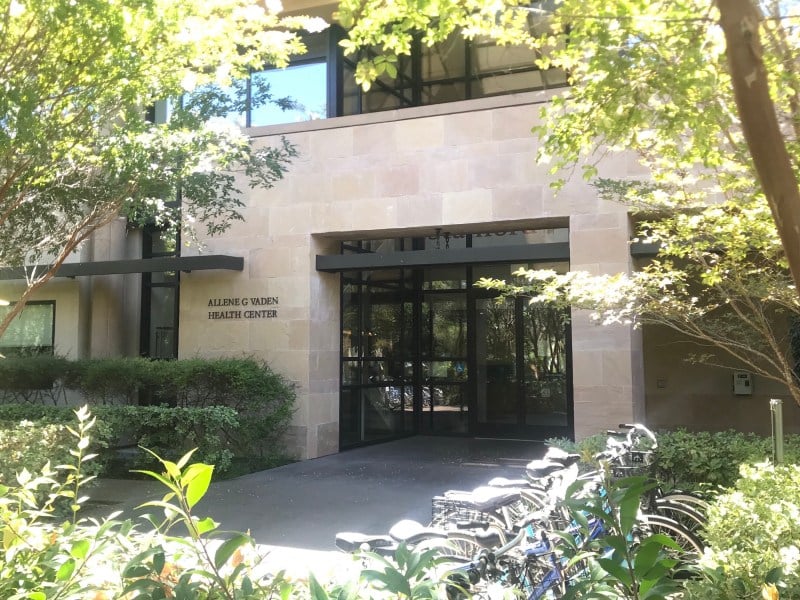In a push to reduce wait times for students seeking mental health care, Counseling and Psychological Services (CAPS) no longer requires students to request a phone assessment appointment before beginning therapy, in favor of a new walk-in system.
Until July, students were previously required to schedule a 15-minute phone session with a clinician to discuss their situation before beginning therapy. This step of the process was identified as the primary driver of long wait times for intake appointments — in some cases, up to one month — according to an internal review that CAPS conducted over the past year.
Under the new model, students can simply walk into CAPS’s Campus Drive headquarters at Vaden Health Center anytime during working hours to discuss their situation with a clinician, who will identify resources and services that address their concerns. Such resources could include a follow-up consultation with the same clinician, a psychiatric consult, a referral to a specialist outside the CAPS system or a joint clinical workshop at CAPS. Following this initial touchpoint, students will wait no more than one week for a longer consultation with a clinician.
With the old system, “The most significant bottleneck was occurring after the phone assessment appointment, because the number of available intake appointments at CAPS was too small to keep up with an increasing volume of requests,” wrote CAPS Director Bina Patel, Vaden Health Center Director Jim Jacobs and CAPS Operations Director Oliver Lin in a joint statement to The Daily. “It was clear that we needed to prioritize real-time access for students.”
Last fall, the number of requests for care exceeded CAPS’s intake capacity by approximately 30%, according to the statement from Patel, Jacobs and Lin. This year, they aim to provide enough initial consult appointments each week to meet student needs, further streamline CAPS processes so that clinicians maximize their face-to-face time with students and minimize their time spent on administrative tasks.
“We are really excited and happy to see Vaden and CAPS taking to heart a lot of years of legitimate student concerns about … wait times at CAPS,” Associated Students of Stanford University President Erica Scott ’20 said. “I think it’s a step in the right direction.”
“Obviously it’s important to recognize there are still aspects of the system that could still be addressed and improved,” Scott added, citing accessibility issues with off-campus healthcare referrals and the lack of support for students and staff from trained mental health professionals. Scott also acknowledged student concerns about the 5150 process that allows putting a voluntary or involuntary psychiatric hold on individuals identified as a threat to themselves or others.
These changes to mental health care follow a difficult year for Stanford as the campus community mourned the deaths of two undergraduates and two graduate students. They also follow a year defined by widespread campus discourse about the dismal state of student mental health among undergraduates and graduate students alike, as well as an ongoing lawsuit filed against Stanford which alleges that the University’s leave of absence policies discriminate against students with mental health disabilities.
The mental health crisis among college students extends beyond Stanford, however. In one nationwide survey, 71 percent of students reported feeling very sad, with 66 percent reporting that they felt overwhelming anxiety. Between 2009 and 2015, moreover, student counseling center utilization increased by approximately 30 to 40%, although overall college enrollment increased by 5%, according to the Center for Collegiate Mental Health.
“Stanford recognizes the urgent need to respond to these trends, and I have appreciated the campus-wide support and interest in addressing these concerns,” Patel told Stanford News. “But we also want to be proactive in promoting positive mental health and well-being. We know these efforts are works-in-progress, and that we will have to continuously evolve in order to meet the needs of our students.”
Beyond CAPS, the Well-Being at Stanford office — another department within Vaden that provides coaching, academic courses and workshops to broadly support student health on campus — is also expanding its mental health services this year. Notably, the program has launched a pilot coaching program for students who may not need therapy but would like someone to talk to.
“We decided to develop this coaching program out of recognition that all of us need support at times in our lives, but not all of us need clinical services such as psychotherapy,” Inge Hansen, the inaugural director of the office, wrote in an email to The Daily.
Hansen added that the pilot program is intended to help students manage challenges including life transitions, stress, grief and loss, loneliness, interpersonal conflict, unhealthy eating and values conflicts.
Well-Being at Stanford is also hiring three new full-time student support specialists to support the needs of specific campus communities. One specialist will focus on community centers and ethnic-themed dorms, another will interface with Residential Education and Academic Advising and a third will partner with the Graduate Life Office to support graduate students. These student advisors will provide individual coaching for students based on their area of specialty and will help develop mental health and well-being programming on campus, Hansen said.
Contact Claire Wang at clwang32 ‘at’ stanford.edu.
